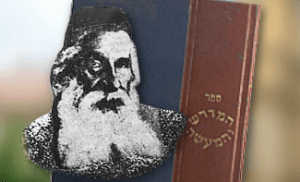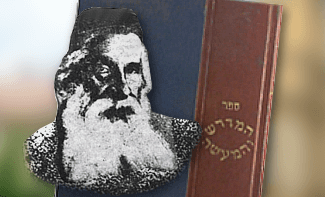
The story is a familiar one. Dovid’s words are inexplicable.
Naval, a thoroughly despicable scoundrel, was rich and successful. His shepherds and flocks had enjoyed the protection and support of Dovid’s men. Although word of Dovid’s anointing as the successor to Shaul had gotten out, he had still not overcome all opposition or consolidated his position as king. He lived, with his loyal men, a less than regal existence, often short of supplies. Figuring that Naval might reciprocate the favor that he had done for him, Dovid sent a message to him, requesting food – whatever he thought was appropriate – for his hungry men. Naval’s response combined, in equal parts, ingratitude, selfishness, and contempt for Dovid. It was so over-the-top, that Dovid would have exercised his right as legal king to find Naval guilty of lèse majesté and have him executed, were it not for the insightful behavior of Naval’s wife, Avigail.
What leaves us puzzled are the seemingly obsequious words Dovid addresses to Naval when he hoped to get him to share his food. “Koh lechoi/ Such for life! Shalom upon you. Shalom upon your household. Shalom upon all that is yours.”[2] Shalom is one of the Names of G-d. We would like to believe that Dovid – even in a time of need – would not squander it on the likes of a Naval. And if for some reason he in fact meant it as a berachah, it was a singular failure. Ten days later, HKBH finished Naval off Himself. So much for the berachah of a tzadik…
Dovid’s words were not born of desperation, but of keen understanding of the mindset of the self-centered. They shelter themselves, in their own minds, behind walls fortified by their wealth and power, believing that their good fortune will last forever, and that they have no need for anyone else. Why, they argue, should they share anything of theirs with anyone else?
Dovid sought to convey one powerful message, that he thought might put a dent in Naval’s thinking: no man can be self-sufficient.
Man has many needs. All of them require the assistance of other people. Health, wealth, tranquility, honor – all depend on networks of association. The clothes that he wears, the food he eats, the shelter in which he dwells – all require many people to produce. If a person should find himself in adequate supply of those things, his life would still not be secure. His spouse, his children, the relatives he cares for – all of them require the same elements to live happy lives.
We can find in this another level of understanding of the gemara’s[3] “It is forbidden for a person to fill his mouth with laughter in this world.” This dictum mandates that we curtail our mirth in a world that continues to see the Beis HaMikdosh lying in ruin. But it also may suggest a sobering perspective on life. No person’s happiness can be complete when he realizes how fragile it is. At the moment that a person feels overcome by joy, some loved one or some friend may, unbeknownst to him, face an unforeseen challenge or tragedy.
Dovid presented this sobering thought to Naval. “Koh lechoi” – such is life! This is the lot of everyone who has lived. Our personal happiness is never assured, because it is not limited to ourselves. “Shalom upon you.” That will make you happy. But how real is it? Can you feel euphoric, without assuring that there is “Shalom upon your household” as well? Even that will not get you where you want to be, because you require “Shalom upon all that is yours.” With all these elements feeding into your personal happiness – and all of them dependent upon many other people – how can you be so dismissive of all other people, and smugly look at yourself as self-contained? A short time ago, your own shepherds were vulnerable and exposed. You sat at home, complacent in your wealth, and had no idea that your men and your property were in danger. I, Dovid, bailed you out by protecting them. Can you dismiss my importance with impunity? Should you not pay more attention to the inter-dependence of people, and how we must all help each other?
Chazal[4] observe that the Torah begins with chesed (Hashem making clothes for Adam and Chavah) and ends with chesed (His burial of Moshe.) But what does this tell us? Do we ever rate a book based on just its begin and end? Rather, this too, is a commentary on the Book of Life. The first thing we do for a newborn is not to give it food, drink, or the keys to the family vehicle. Rather, we cover it; we wrap it in a cloth to keep it warm. The last thing we do for someone at the other end of life’s journey is also to cover him – in this instance, by piling earth on his remains.
Yet, with all that we rely on others for our happiness and well-being, too many people abuse the relationship, using their sharp tongues to hurt others. Speakers of lashon hora, the cause of the nega’im in our parshah,[5] come in various grades of toxicity. The worst is the one who speaks brazenly, maliciously, and openly, without shame. He is followed by one who will not lower himself that much, but will only indulge when he can excuse his behavior as motivated by concerns for the public good – to alert the community to dangers lurking in the background. Better than those is the person who does not speak lashon hora, but nonetheless enjoys listening in when others speak. The best is one who does not speak, and even absents himself from the company of those who do. But when rumors get to him, he remembers that halachah allows a person to at least take into account the possibility that the rumor might be true, and protect himself from harm. This person, however, goes too far in changing his behavior towards the putative wrongdoer, and withholds all sorts of favors from him.
The oft-quoted verses in Tehillim[6] address all of these, serially. “Guard your tongue from evil,” we tell the brazen speaker of lashon hora. “And your lips from speaking deceit,” we tell the person who hides his evil inclination behind a veneer of concern for the public good. To the person who cannot draw himself away from the company of lashon hora speakers, and silently takes in the gossip, we say “Turn away from evil.” Finally, to the person who neither speaks it or listens to it, but reacts to what he hears too defensively, we urge, “Do good!” Do not allow what you hear to interfere with the relationship you previously enjoyed with the target of the lashon hora.


